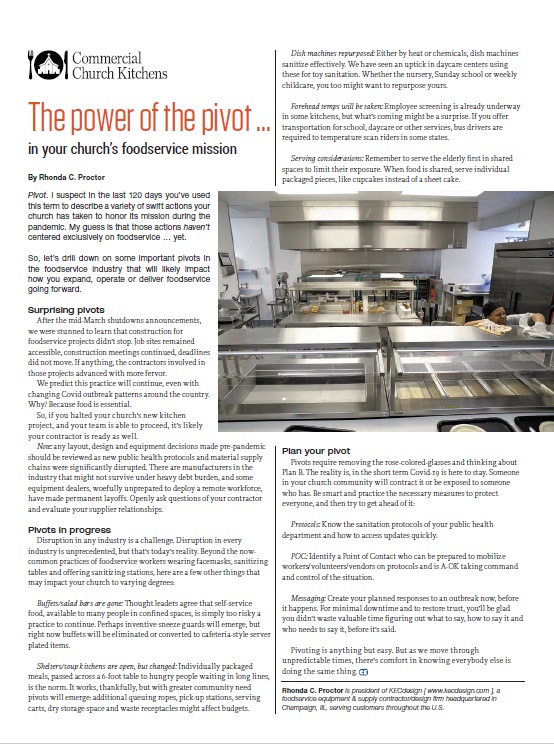
By Rhonda C. Proctor
 Pivot. I suspect in the last 120 days you’ve used this term to describe a variety of swift actions your church has taken to honor its mission during the pandemic. My guess is that those actions haven’t centered exclusively on foodservice … yet.
Pivot. I suspect in the last 120 days you’ve used this term to describe a variety of swift actions your church has taken to honor its mission during the pandemic. My guess is that those actions haven’t centered exclusively on foodservice … yet.
So, let’s drill down on some important pivots in the foodservice industry that will likely impact how you expand, operate or deliver foodservice going forward.
Surprising pivots
After the mid-March shutdowns announcements, we were stunned to learn that construction for foodservice projects didn’t stop. Job sites remained accessible, construction meetings continued, deadlines did not move. If anything, the contractors involved in those projects advanced with more fervor.
We predict this practice will continue, even with changing Covid outbreak patterns around the country. Why? Because food is essential.
So, if you halted your church’s new kitchen project, and your team is able to proceed, it’s likely your contractor is ready as well.
Note: any layout, design and equipment decisions made pre-pandemic should be reviewed as new public health protocols and material supply chains were significantly disrupted. There are manufacturers in the industry that might not survive under heavy debt burden, and some equipment dealers, woefully unprepared to deploy a remote workforce, have made permanent layoffs. Openly ask questions of your contractor and evaluate your supplier relationships.
Pivots in progress
Disruption in any industry is a challenge. Disruption in every industry is unprecedented, but that’s today’s reality. Beyond the now-common practices of foodservice workers wearing facemasks, sanitizing tables and offering sanitizing stations, here are a few other things that may impact your church to varying degrees:

Buffets/salad bars are gone: Thought leaders agree that self-service food, available to many people in confined spaces, is simply too risky a practice to continue. Perhaps inventive sneeze guards will emerge, but right now buffets will be eliminated or converted to cafeteria-style server plated items.
Shelters/soup kitchens are open, but changed: Individually packaged meals, passed across a 6-foot table to hungry people waiting in long lines, is the norm. It works, thankfully, but with greater community need pivots will emerge: additional queuing ropes, pick-up stations, serving carts, dry storage space and waste receptacles might affect budgets.
Dish machines repurposed: Either by heat or chemicals, dish machines sanitize effectively. We have seen an uptick in daycare centers using these for toy sanitation. Whether the nursery, Sunday school or weekly childcare, you too might want to repurpose yours.
Forehead temps will be taken: Employee screening is already underway in some kitchens, but what’s coming might be a surprise. If you offer transportation for school, daycare or other services, bus drivers are required to temperature scan riders in some states.
Serving considerations: Remember to serve the elderly first in shared spaces to limit their exposure. When food is shared, serve individual packaged pieces, like cupcakes instead of a sheet cake.
 Plan your pivot
Plan your pivot
Pivots require removing the rose-colored-glasses and thinking about Plan B. The reality is, in the short term Covid-19 is here to stay. Someone in your church community will contract it or be exposed to someone who has. Be smart and practice the necessary measures to protect everyone, and then try to get ahead of it:
Protocols: Know the sanitation protocols of your public health department and how to access updates quickly.
POC: Identify a Point of Contact who can be prepared to mobilize workers/volunteers/vendors on protocols and is A-OK taking command and control of the situation.
Messaging: Create your planned responses to an outbreak now, before it happens. For minimal downtime and to restore trust, you’ll be glad you didn’t waste valuable time figuring out what to say, how to say it and who needs to say it, before it’s said.
Pivoting is anything but easy. But as we move through unpredictable times, there’s comfort in knowing everybody else is doing the same thing.
Rhonda C. Proctor is president of KECdesign, a foodservice equipment & supply contractor/design firm headquartered in Champaign, Ill., serving customers throughout the U.S.


